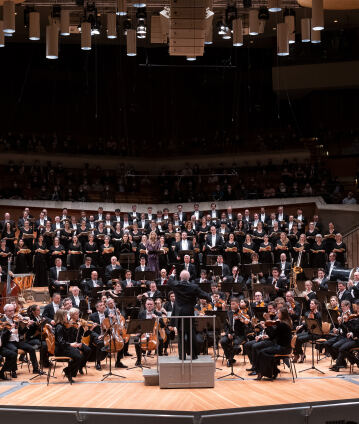Daniel Barenboim conducts Verdi’s Requiem

Hans von Bülow, the first chief conductor of the Berliner Philharmoniker, was deeply moved: “Even in a rather mediocre performance,” he wrote to Giuseppe Verdi, his Requiem had “moved me to tears”. The work does, in fact, have an emotional immediacy that is unusual for liturgical music – for example, in the Dies Irae, which depicts a shattering apocalypse. This performance will be led by Daniel Barenboim, honorary conductor of the Berliner Philharmoniker.
In the year of the premiere of Giuseppe Verdi’s Requiem, Hans von Bülow, then an ardent admirer of Richard Wagner’s music, wrote a scathing review of the work. Almost two decades later, however, he recognised his error of judgement. The later chief conductor of the Berliner Philharmoniker wrote Verdi a letter which he declared to be the “confession of a remorseful sinner”. The Italian composer replied magnanimously and accepted the apology. The episode had a dignified aftermath: at memorial concerts, the Berliner Philharmoniker played the Requiem both in March 1894 after Bülow’s death and seven years later, after Verdi himself died.
Bülow’s accusation that Verdi’s Requiem is an “opera in church garb” is misleading if only because the composer’s great stage works also express empathy for people’s suffering and their need for peace – both central themes of the text of the Mass. At the peak of his mature style, Verdi relied in the Requiem on both sharp contrasts and gripping climaxes and he devised a clear dramaturgy: for example, the instrumental opening passage makes a poignant return towards the end of the work, when a soprano solo floats above the a cappella singing of the choir. At points like these, Verdi’s Requiem – although the composer was by no means religious in the strict sense – brings forth the radiance of an almost unearthly beauty.
The Requiem, which was one of the favourite pieces of chief conductors Herbert von Karajan and Claudio Abbado, is performed here for the first time by the Berliner Philharmoniker under the baton of their honorary conductor Daniel Barenboim.
© 2022 Berlin Phil Media GmbH
Related interviews
Artists
Our recommendations
- Nicola Luisotti conducts Poulenc’s Gloria and Prokofiev’s Fifth Symphony
- Christian Thielemann conducts a concert “à la française”
- A Beethoven evening with Nikolaus Harnoncourt
- Concert celebrating the 25th Anniversary of the Fall of the Berlin Wall
- “The Golden Twenties”: Kirill Petrenko conducts Weill and Stravinsky
- Bach’s “St John Passion” with Simon Rattle and Peter Sellars